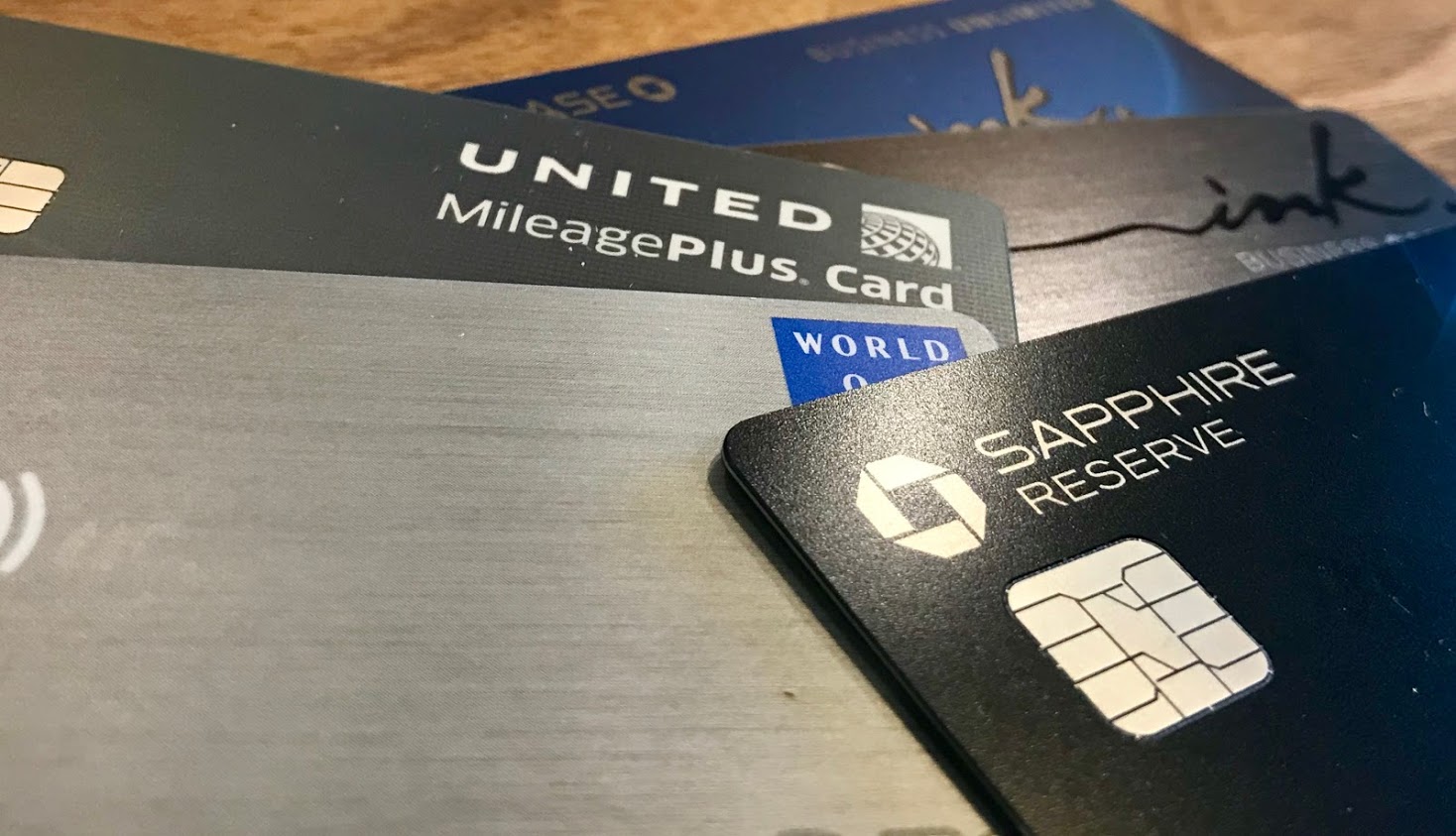
The quickest and easiest way to amass points and miles is through credit card welcome bonuses. In this post I’ll demonstrate a credit card plan for a beginner starting from scratch to amass over 500,000 points in about a year.
This post was first published a year ago. Since then some new credit cards and new credit card benefits have hit the scenes, and many welcome offers have changed. So, I’ve rewritten this post to reflect current conditions. Please note that this is a constantly shifting landscape so recommendations for even 3 months from now may no longer be valid at that time. If you subscribe to our newsletter, though, you’ll be kept up to date with these changes as they happen.
Assumptions
It’s impossible to make a general plan that applies to everyone. Readers differ drastically in terms of their financial situation, credit worthiness, ability/willingness to apply for business cards, travel goals, travel preferences, and interest in learning the tough stuff (such as how to eek out the most value from your airline miles).
All of those complicating factors just scratch the surface. For this post I’ll make the following assumptions about the reader:
- Good credit score
- Hasn’t applied for any new credit cards in the past few years.
- Typically spends about $1,500 per month via credit cards
- Additionally spends $1500 per month in rent
- Does not have a business
- Relationship status: single
- Travels mostly domestically, but would like to do more. Would also like to travel internationally a couple of times per year.
- Not interested in learning rewards programs in-depth. Prefers a simple approach to earning and spending rewards.
Given the above, I can look at current credit card welcome offers to suggest a simple beginner credit card plan…
Beginner credit card plan overview
Contrary to conventional wisdom, opening a bunch of new credit card accounts won’t hurt your credit score long term as long as you pay your credit card bills in full each month and avoid charging near your limit (e.g. it’s better to keep your credit utilization low relative to the amount of credit you have available). In fact, many people see their credit score increase a few months after starting to apply for multiple cards. The general process for earning points this way is described in our Start Here page.
When you get started, if all goes well you’ll earn lots of rewards and your credit score will go up a bit (or remain relatively stable). On the other hand, once you’ve opened a bunch of cards, it will be harder to get approved for new cards from certain banks. Chase, in particular, has the dreaded 5/24 Rule. If you have opened 5 or more cards in the past 24 months, from any bank, Chase won’t approve you for any more cards. For that reason, anyone considering applying for a bunch of credit cards should think seriously about starting with Chase. Chase has quite a few outstanding cards and it would be a shame to lose your ability to get those cards due to opening cards first from other banks. See: “Must have” Chase cards for more details.
Capital One is also extremely hard on approvals for those who have opened many new accounts. I’m not aware of any hard and fast 5/24 rule, but anecdotally they seem to weigh recent card openings very heavily against the applicant. Personally, I haven’t been approved for any Capital One cards despite having an excellent credit score.
In my opinion, the Capital One Venture Rewards Credit Card is particularly good for those starting out with credit card rewards. This card earns 2X everywhere, and points (they call them “miles”) are very easy to redeem. Simply charge travel to your card and then you can use points “miles” to “erase” those statement charges at a value of 1 cent each. As you get more advanced, you can alternatively transfer points to airline partners. If you know what you’re doing, this can lead to far more value from your points.
For the above reasons, the plan I’ve put together focuses first on obtaining the Capital One Venture Rewards card and a number of “must-have” Chase cards:
- Capital One Venture Rewards Credit Card: Great beginner card overall for solid rewards for all spend, plus the ability to transfer rewards to airline miles.
- Sapphire Preferred: Earn 2X Ultimate Rewards points for travel & dining. Points worth 1.25 cents each towards travel. Points are transferable to a number of airline and hotel programs. If you decide later that you prefer the Sapphire Reserve card, it still makes sense to start with the Sapphire Preferred card (since it has a higher intro bonus) and then upgrade to the Sapphire Reserve a year later.
- Chase Freedom Flex: Earn 5X Ultimate Rewards points for travel booked through Chase, 5X in changing categories each quarter, 3X dining, and 3X drugstores. This card is advertised as a cash back card but it actually earns Ultimate Rewards points. Use this card to earn huge point bonuses for spend (3X to 5X) then freely move those points to your Sapphire Preferred card to make them more valuable. This card does charge foreign transaction fees so leave it at home when traveling internationally. See our Chase Ultimate Rewards Guide for more information. Note that if you opt not to go for the Capital One Venture Rewards card, then I’d recommend you get the Chase Freedom Unlimited instead of the Freedom Flex since it is better for “everywhere else” spend.
- World of Hyatt: Keep for the annual free night certificate. Consider spending $15K per year for a second certificate, especially if you pursue Hyatt status since you’ll earn 2 elite qualifying nights with each $5K spend.
- United Explorer: When the annual fee comes due after a year, consider downgrading to the no-fee United card which preserves this card’s best features: Improved economy saver award availability, and last seat standard economy award availability.
Note that Chase offers cards from three hotel chains: Hyatt, IHG, and Marriott. Depending upon the reader’s hotel chain preference, it can make sense to go for the Marriott card or IHG card instead of the Hyatt card. For those considering Marriott, keep in mind that Amex also offers a Marriott card, so once you are over 5/24 it’s still possible to pickup a new Marriott card (the Amex version).
A no-business-card plan
The scenario here is that the reader doesn’t have a business and therefore can’t or won’t apply for business cards. It’s important to consider this decision carefully before proceeding. By ignoring business cards, you’ll soon lose the option to open Chase business cards (due to the 5/24 rule), and in my opinion these are some of the best rewards cards on the market.
That said, I realize that many readers are hesitant to open business cards because it seems scary or unethical. For that reason, the plan detailed below focuses only on personal cards. I’ll follow up in a later post with a plan that includes business cards.
| Applying for Business Credit Cards Yes, you have a business: In order to sign up for a business credit card, you must have a business. That said, it's common for people to have businesses without realizing it. If you sell items at a yard sale, or on eBay, for example, then you have a business. Similar examples include: consulting, writing (e.g. blog authorship, planning your first novel, etc.), handyman services, owning rental property, renting on airbnb, driving for Uber or Lyft, etc. In any of these cases, your business is considered a Sole Proprietorship unless you form a corporation of some sort. When you apply for a business credit card as a sole proprietor, you can use your own name as your business name, use your own address and phone as the business' address and phone, and your social security number as the business' Tax ID / EIN. Alternatively, you can get a proper Tax ID / EIN from the IRS for free, in about a minute, through this website. Is it OK to use business cards for personal expenses? Anecdotally, almost everyone I know uses business cards for personal expenses. That said, the terms in most business card applications state that you should use the card only for business use. Also, some consumer credit card protections do not apply to business cards. My advice: don't use the card for personal expenses if you're not comfortable doing so. |
How much spend?
Most credit card offers require meeting spend requirements in order to earn an early spend bonus. And, in most cases, 3 months is the magical amount of time you have to meet those requirements. So, let’s look at how much spend our fictional person can achieve in three months:
Since our fictional person spends $1500 per month on credit cards, he/she already spends $4500 every 3 months. Additionally, he/she could spend another $1500 per month via credit card by using a bill payment service like Plastiq to pay rent (please see this post for details). Plastiq would charge $42.75 in fees (2.85%) for each $1500 bill payment. That fee can be well worth it in order to qualify for welcome bonuses. Altogether, it’s possible for our fictional newbie to spend $9000 in 3 months. I’d prefer a plan that limits Plastiq fees though, so I’ll assume a total of $6,000 to $8,000 spend every 3 months.
Preparation
Before applying for any new cards, I recommend signing up for Travel Freely. This is a free web-based tool that walks you through the process of applying for cards to earn big bonuses. The tool keeps track of your cards including your 5/24 status, alerts you when time is running out to complete minimum spend, alerts you when annual fees are nearly due, and much more. I consider it essential for anyone starting out.
Here’s the link to sign up (for free) with Travel Freely. Full disclosure: Frequent Miler and Travel Freely have a business relationship, but only because I believe that this tool is truly useful for anyone into opening cards for their bonuses. I use it to manage my strategy and those of several family members as well. You can read more of my thoughts about Travel Freely here: Take the stress out of credit card bonus hunting: Travel Freely.
First set of cards in the beginner credit card plan:
Capital One Venture Rewards Credit Card
At the time of this writing, Capital One is offering a limited time 100K offer. To get the full 100K bonus points, you would have to spend $20K in 12 months on the card. However, if you only spend $3K in 3 months, you’ll still earn the standard 50K bonus. For the purpose of this post, I’ll assume that the reader will go for only the $3K spend. However, if there’s a sudden need for a lot of spend in the next 12 months, or if you can handle more spend than is assumed here, it will be great to have the option to fulfill the full $20K spend to get the full 100K bonus.
Note that the Venture Rewards card offers Global Entry / TSA Pre Check credit. That means that you can use it to pay the signup fee for Global Entry or TSA Pre Check and you’ll get reimbursed up to $120. Global Entry includes TSA Pre Check, so you might as well get Global Entry if you have access to an interview center.
Since welcome bonuses change over time, the following display shows the current offer at the time you read this on the web:
| Card Offer and Details |
|---|
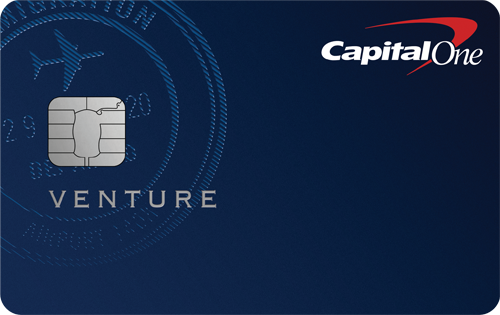 ⓘ $985 1st Yr Value EstimateClick to learn about first year value estimates 75K Miles ⓘFriend-ReferralThis is a friend-referral offer. A member of the Frequent Miler community may earn a referral bonus if you are approved for this offer 75k miles after $4k spend within first 3 months$95 Annual Fee Information about this card has been collected independently by Frequent Miler. The issuer did not provide the details, nor is it responsible for their accuracy. Recent better offer: 75k miles after $4k spend within first 3 months + a one-time $250 Capital One Travel credit to use in your first cardholder year FM Mini Review: This card earns 2 "miles" per dollar, which are worth exactly 1 cent each toward travel. This makes the return on spend similar to a 2% cash back card (though in this case you must redeem your miles to offset travel in order to get 1 cent per mile). One big advantage over cash back: Capital One allows transfering their "miles" to airline miles & hotel points. Click here for our complete card review Earning rate: 2X miles everywhere ✦ 5X miles on hotels, vacations rentals and rental cars booked via Capital One Travel Card Info: Mastercard issued by CapOne. This card has no foreign currency conversion fees. Noteworthy perks: Receive up to $120 application fee credit for Global Entry or TSA PreCheck® ✦ Redeem miles for travel at value of 1 cent per mile ✦ Convert "miles" to airline miles & hotel points ✦ No foreign transaction fees |
Chase Sapphire Preferred
At the time of this writing, the Sapphire Preferred has an outstanding welcome bonus (80K points after $4K spend). The following display shows the current Sapphire Preferred offer at the time you read this on the web:
| Card Offer and Details |
|---|
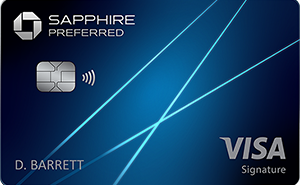 ⓘ $985 1st Yr Value Estimate$50 prepaid hotel credit valued at $35 Click to learn about first year value estimates 75K Points ⓘAffiliateThis is an affiliate offer. Frequent Miler may earn a commission if you are approved for this offer Earn 75,000 bonus points after spending $5,000 within the first three months from account opening.$95 Annual Fee Recent better offer: Expired 5/14/25: 100K after $5K spend FM Mini Review: Great welcome offer. Unlocks ability to transfer points to hotel & airline partners. Solid option to pair with no annual fee Ultimate Rewards cards such as the Freedom cards, Ink Business Cash, and Ink Business Unlimited. Earning rate: 5X Travel booked through Chase Travel℠ (2X all other travel) ✦ 5X Lyft through 9/30/27 ✦3X Dining ✦ 3X Select streaming services ✦ 3X Online grocery ✦ 10% annual point bonus Card Info: Visa Signature issued by Chase. This card has no foreign currency conversion fees. Noteworthy perks: Primary auto rental collision damage waiver ✦ Free DoorDash DashPass (min. one year, must activate by 12/31/27)✦ $10 off each month on one non-restaurant orders from DoorDash ✦ Transfer points to airline & hotel partners ✦ $50 back for hotel stays booked through Chase per cardmember year in the form of a statement credit ✦ Each account anniversary earn bonus points equal to 10% of total purchases made the previous year. |
Second set of cards in the beginner credit card plan:
91 days after your first set of applications, the small hit to your credit report caused by those inquiries should have largely dissipated. In fact, it is common to find that your credit score is higher by this point than it was when you began.
Chase Freedom Flex
At the time of this writing, the Freedom Flex has a great signup offer: 20,000 points after $500 spend plus earn 5X points at grocery stores for the first 12 months, up to $12K in spend. If you spend $1,000 at grocery stores for each of these 12 months, you’ll max out the bonus and end up with 80,000 points! For the purpose of this post, I’ll assume that the reader will spend $1,000 per month at grocery stores (if you don’t usually spend that much at grocery stores, you can always buy a gift cards for stores that you really do shop at more often).
The following display shows the current Freedom Flex offer at the time you read this on the web:
| Card Offer and Details |
|---|
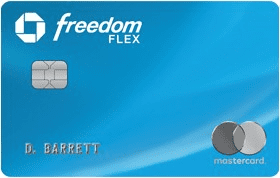 ⓘ $292 1st Yr Value EstimateClick to learn about first year value estimates $200 cash back* ⓘFriend-ReferralThis is a friend-referral offer. A member of the Frequent Miler community may earn a referral bonus if you are approved for this offer Earn $200 (*awarded as 20,000 points) after spending $500 in the first 3 monthsNo Annual Fee Information about this card has been collected independently by Frequent Miler. The issuer did not provide the details, nor is it responsible for their accuracy. FM Mini Review: Great for 5X and 3x categories and World Mastercard benefits. Excellent companion card to Sapphire Reserve, Sapphire Preferred, or Ink Business Preferred. Earning rate: 5x travel booked through Chase Travel℠ ✦ 5X Lyft through September 2027 ✦ 3x dining ✦ 3x drugstores ✦ 5X in rotating categories on up to $1,500 spend per quarter (Q2 2025: Amazon, Streaming Services) Card Info: Mastercard World issued by Chase. This card imposes foreign transaction fees. Noteworthy perks: Free DoorDash DashPass for 6 months upon activation ✦ Cell phone protection ✦ Lyft credits ✦ $10 quarterly credit for non-restaurant DoorDash orders See also: Chase Ultimate Rewards Complete Guide |
Chase World of Hyatt Credit Card
The Hyatt card has a different welcome bonus structure than the others: Earn 25K after $3K spend in 3 months and then earn another 25K after a total of $6K spend in 6 months.
The following display shows the current Hyatt offer at the time you read this on the web:
| Card Offer and Details |
|---|
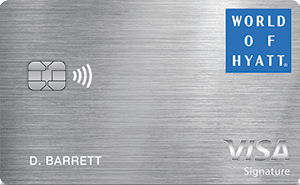 ⓘ $406 1st Yr Value EstimateClick to learn about first year value estimates Up to 45K points Non-AffiliateThis is NOT an affiliate offer. We always present the best offer even when it means less revenue for Frequent Miler 30K points after $3K in spend within the first 3 months, plus an exta 1 point/dollar on up to $15K spend within first 6 months.$95 Annual Fee This card is subject to Chase's 5/24 rule. Information about this card has been collected independently by Frequent Miler. The issuer did not provide the details, nor is it responsible for their accuracy. Recent better offer: 5x Category 1-4 free night certificates after $15K spend within first 3 months. (Expired 10/31/24) FM Mini Review: Great card for welcome offer and annual free night. Might be worth using regularly for additional free night and as a path to status. Earning rate: ✦ 2X restaurants / cafes / coffee shops, airlines, local transit, fitness clubs and gym memberships ✦ 4X Hyatt and Mr & Mrs Smith Card Info: Visa Signature issued by Chase. This card has no foreign currency conversion fees. Big spend bonus: One free Cat 1-4 night certificate after $15K spend in a calendar year. ✦ Get 2 elite qualifying night credits every time you spend $5K in purchases Noteworthy perks: ✦ Free category 1-4 night every year upon renewal ✦ Additional free category 1-4 night after $15K spend in calendar year ✦ Discoverist elite status ✦ 5 elite qualifying nights ✦ Complimentary Instacart+ for 3 months (must activate by 12/31/27) ✦ $10 monthly Instacart credit |
Third set of cards in the beginner credit card plan:
Apply for this one 91 days after the last set of cards. I’ve only included one card this round because you may still be spending big at grocery stores with the Freedom card and you may still be completing the full spend required for the Hyatt card.
Chase United Explorer Card
At the time of this writing, the United card offer is for 60,000 miles after $3K spend. This offer is expected to expire on 9/30/20 though, so it’s likely that the offer will be different by the time you’re ready for this card.
Before you apply for the United card, I highly recommend logging into your United account and going through the steps of buying airfare (you can stop before actually filling out your credit card info if you don’t really have a purchase you want to make). Somewhere in that process, you may get an offer for this card that is better than the public offer.
The following display shows the current public United Explorer card offer at the time you read this on the web:
| Card Offer and Details |
|---|
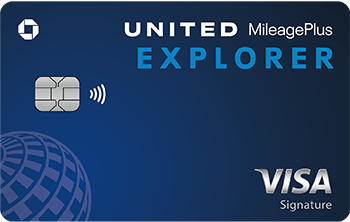 ⓘ $791 1st Yr Value EstimateClick to learn about first year value estimates Up to 65k miles ⓘAffiliateThis is an affiliate offer. Frequent Miler may earn a commission if you are approved for this offer Limited Time Offer: 60K miles after $3K spend in 3 months. Plus, earn an extra 5,000 miles after you add an authorized user to your account in the first 3 months your account is open.$0 introductory annual fee for the first year, then $150 Alternate Offer: There is currently an in-flight offer for up to 75K. This card is subject to Chase's 5/24 rule (click here for details). Recent better offer: 80K Miles after $3K in spend (expired 5/8/25) FM Mini Review: Decent perks such as free 1st checked bag and 2 annual club visits makes this a keeper for some. Earning rate: 2X United ✦ 2X restaurants ✦ 2X on hotel stays Card Info: Visa Signature issued by Chase. This card has no foreign currency conversion fees. Big spend bonus: $100 Travel Credit after spending $10,000 in a calendar year ✦ 10,000-mile award flight discount after spending $20K ✦ Earn up to 1,000 PQPs per calendar year: 1 PQP per $20 spend Noteworthy perks: 2 United Club passes per year on you anniversary ✦ Improved economy saver award availability ✦ Free first checked bag for primary cardholder and one travel companion when you pay with the card ✦ Up to $100 in credits for United Hotels ($50 each on your first two bookings per cardmember year) ✦ Up to $60 per year in rideshare credits (up to $5 per month) when using your card to pay for rideshare services.(requires annual enrollment) ✦ Up to $50 in Travel Credit for Avis or Budget car rentals per cardmember year ✦ One $10 Instacart credit per month when you have Instacart+ membership ✦ Priority boarding ✦ One year of complimentary Dash Pass (Must activate by 12/31/27) ✦ Primary auto rental collision damage waiver ✦ Up to $120 Global Entry, TSA Pre-check or Nexus credit ✦ 25% back as a statement credit on purchases of food, beverages and Wi-Fi on board United-operated flights and on Club premium drinks when you pay with your Explorer Card |
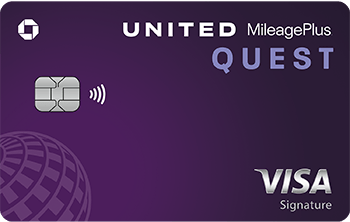 ⓘ $1048 1st Yr Value Estimate$200 TravelBank cash valued at $170 Click to learn about first year value estimates 100K Miles + 3,000 PQPs ⓘAffiliateThis is an affiliate offer. Frequent Miler may earn a commission if you are approved for this offer 100K miles and 3,000 PQPs after $4K spend in the first 3 months. $350 Annual Fee This card is subject to Chase's 5/24 rule (click here for details). Recent better offer: None. Earning rate: 5X Renowned Hotels & Resorts for United Cardmembers ✦ 3X United ✦ 2X restaurants including eligible delivery services ✦ 2X on all other travel ✦ 2X select streaming Base: 1X (1.3%) Flights: 2X (2.6%) Hotels: 2X (2.6%) Other Travel: 2X (2.6%) Dine: 2X (2.6%) Brand: 3X (3.9%) Other: 2X (2.6%) Card Info: Visa Signature issued by Chase. This card has no foreign currency conversion fees. Big spend bonus: Earn up to 18,000 PQPs per calendar year: 1 PQP per $20 spend ✦ Earn an additional 10,000-mile award flight discount after $20K in purchases in a calendar year ✦ Earn 2 global Economy Plus seat upgrades after $40K in purchases in a calendar year ✦ Starting in 2026, 1,000 bonus PQPs each year Noteworthy perks: $200 in United® TravelBank cash each membership year - terms apply ✦ Up to $150 in statement credits per cardmember for Renowned Hotels and Resorts ✦ 10K award flight discount per cardmember year ✦ First and second checked bag free for cardholder and one companion when you purchase your tickets with the card and include your MileagePlus number ✦ Up to $120 Global Entry, TSA PreCheck or Nexus reimbursement ✦ Up to $100 in rideshare credits per year (up $8 per month January to November and up to $12 in December, re-enrollment is required annually) ✦ Up to $80 in Travel Credit for Avis or Budget car rentals per cardmember year ✦ One $10 and one $5 Instacart credit per month when you have Instacart+ membership ✦ 25% back on United inflight or Club Premium drink purchases |
Fourth set of cards in the beginner credit card plan:
At this point, you should have an excellent set of “must have” Chase cards and so you’re free now to seek the best available bonus from any issuer. At the time of this writing, my recommendation is to go for the Hilton Aspire 150K offer and the Amex Gold 60K offer (you’ll have to space these two Amex applications about a week apart).
In general, I recommend looking at our Best Credit Card Offers page for an up to date list of cards with the best welcome bonuses.
Hilton Aspire
| Card Offer and Details |
|---|
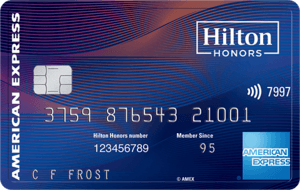 ⓘ $1120 1st Yr Value Estimate$400 Hilton resort credit ($200 per six months) valued at $280, Hilton Free Night valued at $490, $200 airline credit ($50 per quarter) valued at $160 Click to learn about first year value estimates 175K Points + free night certificate ⓘFriend-ReferralThis is a friend-referral offer. A member of the Frequent Miler community may earn a referral bonus if you are approved for this offer 175K after $6K spend in first 6 months. Free night certificate every year - first certificate is awarded 8-12 weeks after approval. Terms apply. (Offer Expires 8/13/2025)$550 Annual Fee Information about this card has been collected independently by Frequent Miler. The issuer did not provide the details, nor is it responsible for their accuracy. Recent better offer: (Expired 4/29/25) 175K after $6K spend in first 6 months FM Mini Review: This card is loaded with valuable perks that are more than worth the card's annual fee if you stay in Hilton resorts at least twice per year. Earning rate: ✦ 14X Hilton spend ✦ 7X US restaurants, flights booked directly with airlines or amextravel.com, select car rental companies ✦ 3X on all other eligible purchases ✦ Terms & Limitations Apply. Card Info: Amex Credit Card issued by Amex. This card has no foreign currency conversion fees. Big spend bonus: Additional free night awards after $30K and $60K in eligible purchases in calendar year Noteworthy perks: ✦Annual Free Night Reward every year upon renewal ✦ Free Diamond Status ✦ Up to $400 Hilton Resort Credit per calendar year ($200 semi-annually) ✦ $200 Flight Credit ($50 per quarter for purchases directly with airlines or via Amex Travel) ✦ $199 CLEAR (R) Plus fee credit per calendar year ✦ $100 on-property credit w/ Aspire Card package ✦ Terms Apply. See Rates & Fees See also: Amex Hilton Aspire In-Depth Review |
Amex Gold Card
| Card Offer and Details |
|---|
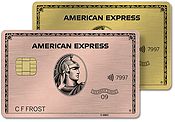 ⓘ $1307 1st Yr Value Estimate$120 Dining credit ($10 per month) valued at $30, $100 Resy credit ($50 per six months) valued at $85, $120 Uber credit ($10 per month) valued at $60 Click to learn about first year value estimates As high as 100K points ⓘAffiliateThis is an affiliate offer. Frequent Miler may earn a commission if you are approved for this offer As high as 100K points after $6K spend in 6 months. Welcome offers vary and you may not be eligible for an offer. Terms apply. Rates & Fees$325 Annual Fee Alternate Offer: Referral Offer - 90K points after spending $6,000 in 6 months Recent better offer: 100K after $6K in the first 6 months + 20% back at restaurants for the first 12 months up to $250 back [Expired 11/10/24 - referrals only] FM Mini Review: This card offers an awesome return on US supermarket and worldwide dining spend, putting it at or near the top-of-class in both categories. Dining credits and Uber / Uber Eats credits go a long way towards reducing the sting of this card's annual fee. Earning rate: 3X points for flights booked with airlines or on amextravel.com ✦ 4x points at US Supermarkets (up to $25K in purchases, then 1x) ✦ 4x at restaurants worldwide (up to $50k in purchases, then 1x) ✦ 1X points on other purchases. Terms apply. Card Info: Amex Pay Over Time Card issued by Amex. This card has no foreign currency conversion fees. Noteworthy perks: Up to $10 in statement credits monthly with participating dining partners (Goldbelly, Wine.com, Five Guys, Seamless/Grubhub, The Cheesecake Factory) ✦ $10 monthly Uber or Uber Eats credit (use it or lose it each month - must select Amex card as payment method to redeem) ✦ $7 monthly Dunkin' credit - enrollment required ✦ $50 twice-annual Resy credit ✦ $100 hotel credit on qualifying charges on stays of 2 nights or longer, plus a room upgrade upon arrival, if available with The Hotel Collection at americanexpress.com/hc ✦ Enrollment required for select benefits. |
Add it all up
Assuming success at getting approved for all of the above cards and in meeting the spend requirements, and assuming that the welcome offers remain the same as the time of this writing, we should have earned the following numbers of points:
| Card | Spend | Points from Spend | Points from Welcome Bonus | Total Points Earned |
|---|---|---|---|---|
| Venture Rewards* | $3K | 6K | 50K | 56K |
| Sapphire Preferred | $4K | 4K | 80K | 84K |
| Freedom Flex | $12K | 60K | 20K | 80K |
| World of Hyatt | $6K | 6K | 50K | 56K |
| United Explorer | $3K | 3K | 60K | 63K |
| Hilton Aspire | $4K | 12K | 150K | 162K |
| Amex Gold | $4K | 4K | 60K | 64K |
* The totals shown above for the Capital One card assume one stops spend after $3,000. If you qualify for the limited time 100K offer, then you could optionally spend $17K more to get a total of 100K points from the welcome bonus and a total of 40K points from spend.
In total, we’re looking at 565,000 points & miles in 12 to 15 months. It’s actually possible to do even better than this, but this plan offers a solid start and ensures that you have some of the key cards in your portfolio for ongoing success in earning points and traveling for free.





Greg, great posts about a starting off strategy.
My son will be 18 in September, he already has 4 authorized user accounts from me ranging from my oldest 20 year Discover to newest CapitalOne 3 years all with $10k+ limits
Will this beginning strategy work for 18 year olds?!? With Great Fido and aged only aged premium A/U accounts?
Also note he has a legitimate tax paying business, since 16, he has it registered with the state, bizz checking (citizens bank allows 17) already paid self employment tax state/federal last year and now paying 1/4 estimated this year, minimum spend for any bonus will not be an issue because he’s reinvesting most of his revenue on supplies & advertising etc
He wants the juicy chase ink cards asap but I think a year+ needs to pass?!?
Normally I’d recommend signing up for a Discover It card when turning 18 or another student card of some kind and then waiting about a year to build credit. But in this case, since he has a legitimate business and cashflow, another option is to go open a business checking account at a Chase bank. There’s a very good chance that he’ll be offered an Ink card at the end of the process and if he signs up then, I think there’s a great chance of getting approved.
Greg
Great post I don’t remember this post from a year ago .
But I like the CAUTION !! sign get the house BEFORE u play this Game,,
Unreal 1/3/2021 MDW>HNL SW $420rt one stop not bad .
#stayincave
[…] recent Frequent Miler on the Air episode seems to have struck a nerve. Nick took exception to my Beginner Credit Card Plan where I asserted that someone who’s about to sign up for lots of credit cards should get […]
Interesting. Maybe I’ll try the cap one card. Never had one before.
Personally I don’t see much need for the Hyatt card. The annual free night was a struggle for me to use so I canceled the card when the virus hit.
Thanks Greg for the useful intro article; I’ll send it to some family members as a “points and miles 101” course.
Probably as an into article, the obvious needs to be stated (as Kim’s comment says), not to start this endeavor unless able to never carry a balance, and to be organized enough to never have late payments. Also perhaps include something about starting with no-fee cards (or cards able to be downgraded to no fee) for account age on credit score.
I hesitate a bit with Venture Rewards as the first recommendation as an all-around card. I see why you made it, but there are better cash-back cards for cash-back and better points cards for points. It’s almost like someone needs to make that decision before even starting. Or start with a no-fee 2% card for cash-back until ready to make the leap to learning transferable point systems.
Ugh, where is the part of the article that adds up all the annual fees, which apart from the United Explorer card, you are apparently recommending that these newbies pay for the rest of their lives? Where is the ethical warning (or link to such a warning) that this is not recommended for persons who will ever carry a balance or incur fees through late payments.
In my opinion, the best credit card for those starting out in credit cards is a no fee 2% cash back card from Citi or Fidelity to lay down what should be a baseline understanding that you are giving up a minimum of 2% cash back for all spend, and in effect, purchasing those points and miles.
When you boil down your advice in this article for a “beginner,” it is for the next 12-15 months, sign up for 7 or more credit cards, pay $600+ in fees, and make the minimum spend in thousands of dollars, with very few caveats or warnings. It is not the kind of advice that should be touted as a “beginner plan” and verges on the irresponsible in my view.
These are good points. I’ve added a very conspicuous “caution” section near the top.
Thanks for acknowledging the feedback and taking action!
[…] Beginner credit card plan — 325,000 points in 12 months (no business cards) […]
Hey Greg, not a savvy computer guy here, but do you have a recommendation for 0/24 with business cards considered? I’m starting from scratch
Yes, see this follow-up post: https://frequentmiler.com/beginner-plan-solo-business/
Make sure to check current offers though. This is a good reminder that it’s time to update the series since many offers have changed.
I have a question about this statement: “After a year, it should be possible to upgrade to the Reserve card with no new credit inquiry. Note too that you can’t get the bonus on both the Preferred and the Reserve so you wouldn’t be giving up anything to get the Preferred.” Why would one want to upgrade to the Reserve if you can’t get the bonus and it has a higher annual fee? I’m a newbie and am wondering what I might be missing.
The Sapphire Reserve offers better point earning for travel & dining (3X instead of 2X), better point redemption value through the Ultimate Rewards travel portal, and better automatic travel insurance. If you don’t care about those things, then you definitely shouldn’t upgrade. See also our guide to the Sapphire Reserve: https://frequentmiler.com/csr/#Goto
[…] Beginner credit card plan: 325,000 points in 12 months […]
[…] Beginner credit card plan — 325,000 points in 12 months (no business cards) […]
[…] credit card plan for a single person with no ability or willingness to sign up for business cards: Beginner credit card plan — 325,000 points in 12 months. In this post, I’ve done the same thing, but with one huge difference: this plan assumes […]
I think I’d consider skipping the Venture in favor of the longer-term earning potential of the Freedom Unlimited with no annual fee.
1.5 Ultimate Rewards per dollar spent transferred to a Chase Sapphire Reserve puts the floor of redemption value at 2.25¢ for every dollar of credit card spend.
Tips for spouse: start on no fee credit card with only his name to start building his credit after years of AU. Strip him from all my AU to limit his 5/24 and Chase Card count. Put household income as his income. Been doing 2 players plus businesses for 3 years and travel everywhere as a family of 5 on 2 Southwest CP.
Greg,
In the earlier sections you mention Sapphire Reserve, but the subsequent tally is for Sapphire Preferred. I assume Preferred is what you meant in the earlier section, as the steep AF of reserve will intimidate a beginner.
Nevermind. I should learn to read correctly.